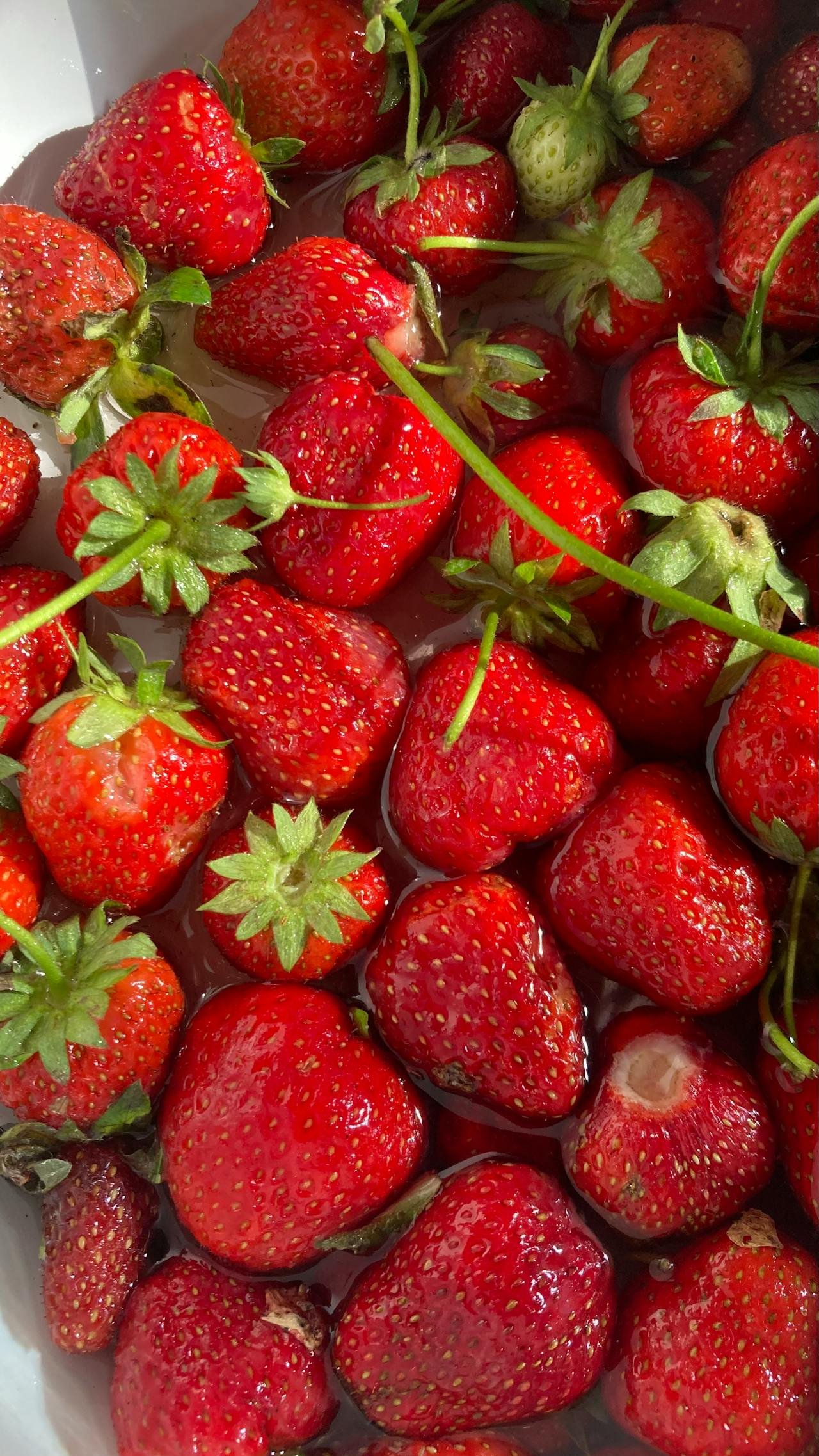Discover the remarkable health benefits of raspberry. From unique varieties to nutritional value, learn how these berries can empower your diet and boost your well-being today. Don’t miss out on the exceptional impact they can make!
Raspberry
Raspberry are a beloved berry known for their vibrant color, tangy flavor, and versatile uses. These small fruits, packed with antioxidants, vitamins, and fiber, not only add a burst of taste to dishes but also offer a range of health benefits. Whether enjoyed fresh, blended into smoothies, or used in desserts and jams, raspberries are a delightful and nutritious addition to any diet. In this blog, we’ll delve into the unique qualities of raspberries, explore their health benefits, and share creative ways to incorporate them into your meals. Get ready to discover why raspberries are more than just a sweet treat—they’re a powerhouse of nutrition and flavor!
What are Raspberries
Raspberries are edible fruits from the Rubus idaeus plant, that belongs to the rose family. They are characterized by their small, red, or sometimes black, purple, or golden, aggregate fruits made up of numerous tiny drupelets. Raspberries are known for their delicate, sweet-tart flavor and are rich in vitamins C and K, dietary fiber, and antioxidants. They grow on thorny shrubs and are popular in a variety of culinary uses, including fresh eating, baking, preserves, smoothies, jams, desserts, and sauces. Raspberries are usually in season during the summer months.
Types Of Raspberry
There are several different types of raspberries, each with their own unique characteristics. Here are some popular types:
1. Red Raspberries (Rubus idaeus)
Red raspberries are the most common and widely known type of raspberry. They have a sweet and slightly tart flavor and are typically deep red in color when ripe. They are generally larger in size compared to other varieties. Some popular red raspberry varieties include Heritage, Latham, and Tulameen.
2. Golden Raspberries (Rubus idaeus ‘Aureus’)
Golden raspberries are a vibrant golden-yellow variant of red raspberries. They have a milder and sweeter flavor compared to red raspberries and are prized for their unique color. They are less tart and have a more delicate flavor profile. Popular golden raspberry varieties include Anne and Fall Gold.
3. Black Raspberries (Rubus occidentalis)
Black raspberries, also known as blackcaps, are typically smaller and have a darker color compared to red raspberries. They have a distinct sweet and earthy flavor and are often used in preserves and desserts. They have a distinct flavor and are typically dark purple or black in color when fully ripe. Some common black raspberry varieties include Jewel, Mac Black, and Munger.
4. Purple Raspberries (Rubus spp.)
Purple raspberries are a hybrid between red and black raspberries. They have a sweeter flavor than black raspberries with a milder tartness. Purple raspberries can range in color from reddish-purple to dark purple or black. They tend to be larger and juicier than black raspberries. Examples of purple raspberry varieties include Brandywine and Royalty.
5. Yellow raspberries
Yellow raspberries have a pale yellow or golden color and a sweet, mild flavor. They are less tart than red raspberries and have a slightly floral taste.
6. Raspberry hybrids
There are also various hybrid raspberry varieties available that combine traits from different raspberry types. For instance, the Tayberry is a cross between a blackberry and a red raspberry, known for its large size and tart flavor. Each type of raspberry has its own unique taste, size, and ripening season. It’s worth exploring and trying different varieties to find the ones that you enjoy the most. Raspberry availability may vary depending on your region and the time of year. So, it’s always best to check with local suppliers or farmers markets for the specific varieties they offer.
Nutritional Value of Raspberry
Raspberries are a nutrient-dense fruit that offers several health benefits.
The nutritional value of Raspberry per 100 grams contains:
- Calories: 52 kcal
- Protein: 1.2 grams
- Fat: 0.7 grams
- Carbohydrates: 12 grams
- Fiber: 6.5 grams
- Sugars: 4.4 grams
- Vitamin C: 26.2 milligrams (approximately 43% of the Daily Value)
- Vitamin K: 7.8 micrograms (about 10% of the Daily Value)
- Folate: 23 micrograms
- Manganese: 0.7 milligrams (around 35% of the Daily Value)
- Magnesium: 22 milligrams
- Iron: 0.7 milligrams
Raspberries are also rich in antioxidants, including anthocyanins, quercetin, and ellagic acid, which contribute to their health benefits by combating oxidative stress and inflammation.
Raspberries offer a wealth of nutrients in a low-calorie package, making them a valuable addition to a balanced diet. Their high fiber content supports digestive health, while their vitamins and antioxidants contribute to overall well-being.
Top 10 Health Benefits of Raspberry
Raspberries are not only a delicious summer treat, but they also provide a wide range of health benefits. These potent berries are packed with nutrients and antioxidants, making them a valuable addition to any diet. In this blog post, we will explore the top health benefits of raspberries and why you should consider incorporating them into your daily routine.
1. Rich in Antioxidants
One of the most significant health benefits of raspberries is their high antioxidant content. Antioxidants are molecules that can neutralize harmful free radicals in the body, protecting cells from damage.
Raspberries are packed with antioxidants such as vitamin C, anthocyanins, ellagitannins, quercetin, ellagic acid, flavonoid and polyphenol. Raspberries are rich in a type of antioxidant called anthocyanins, which give the berries their vibrant red color. These antioxidants help neutralize harmful free radicals in the body, combat oxidative stress and protect the body against chronic diseases like heart disease, cancer, certain neurodegenerative, and age-related conditions.
2. Boosts Immunity
Raspberries are packed with vitamin C, a powerful nutrient known for its immune-boosting properties. Just one cup of raspberries provides over half of the recommended daily intake of vitamin C. This essential vitamin helps strengthen the immune system and protect against infections and diseases. Regular consumption of raspberries may help reduce the severity and duration of common illnesses such as colds and flu.
3. Good for Heart Health
Another incredible health benefit of raspberries is their positive impact on heart health. The high levels of fiber, polyphenols, antioxidants and anti-inflammatory compounds in raspberries can help reduce the risk of heart disease by protecting against oxidative stress and inflammation. They can help assist in reducing inflammation or oxidative stress, lower blood pressure, reduce LDL (bad) cholesterol levels, and improve overall heart health. Additionally, the fiber in raspberries can help lower cholesterol levels, which is a significant risk factor for heart disease.
4. Regulates Blood Sugar Levels
Raspberries are a low-glycemic food, meaning they do not cause a rapid spike in blood sugar levels. This is excellent news for individuals with diabetes or those looking to manage their blood sugar levels. The high fiber content and antioxidant compounds in raspberries also helps slow down the absorption of sugar in the bloodstream, promoting better blood sugar control thereby reducing the risk of type 2 diabetes.
5. Supports Digestive Health
The fiber in raspberries not only helps regulate blood sugar levels but also promotes digestive health. Fiber is crucial for maintaining healthy digestion and preventing constipation. One cup of raspberries provides about 8 grams of fiber, which is a significant portion of the recommended daily intake. Additionally, raspberries contain prebiotic compounds that help nourish the beneficial bacteria in the gut, promoting a healthy balance of gut flora. Eating a diet rich in fiber can support a healthy gut and may reduce the risk of digestive disorders like diverticulitis and colorectal cancer.
6. Anti-Inflammatory Properties
Inflammation is a natural response of the body to injury or infection, but chronic inflammation can lead to various health issues. Luckily, the antioxidants and anti-inflammatory compounds such as anthocyanins, ellagitannins, ellagic acid and quercetin, in raspberries can help reduce inflammation in the body. Regular consumption of raspberries may help alleviate symptoms of inflammatory conditions such as rheumatoid arthritis, heart disease, diabetes, certain cancers, and asthma.
7. Rich in fiber
Raspberries are an excellent source of dietary fiber, with around 8 grams per cup. Adequate fiber intake promotes healthy digestion, promoting regular bowel movements, and preventing constipation. A high-fiber diet can help regulate blood sugar levels, lower the risk of conditions like type 2 diabetes and heart disease. They can also support weight management by promoting feelings of fullness and preventing overeating.
8. Maintains Eye health
Raspberries contain compounds like vitamins C and E, zeaxanthin and other antioxidants, which have been linked to maintaining eye health and reducing the risk of age-related macular degeneration and cataracts.
9. Cognitive function
Research suggests that the antioxidants and anti-inflammatory properties in raspberries may help improve cognitive function and protect against age-related memory decline and cognitive disorders like Alzheimer’s disease.
10. Weight management
Raspberries are relatively low in calories and high in fiber, making them a filling and satisfying fruit choice. The high fiber content of raspberries helps with weight management since it adds bulk to the diet, promotes satiety, and helps control calorie intake. Including raspberries in a balanced diet can therefore promote fullness and help control appetite, which may support healthy weight management.
In conclusion, raspberries are a delicious and nutritious fruit that offers a wide range of health benefits. From boosting immunity to promoting heart health and regulating blood sugar levels, these potent berries are a must-add to your diet. So, next time you’re at the grocery store, make sure to grab some raspberries and reap the benefits they have to offer.
Uses Of Raspberries
Raspberries are versatile and can be used in various culinary ways due to their sweet and tangy flavor and health applications. Here are some common uses of raspberries:
A. Culinary Uses
1. Fresh consumption
Raspberries can be enjoyed on their own as a healthy snack. Simply wash them and eat them as they are or add them to fruit salads for added sweetness and texture.
2. Smoothies and juices
Raspberries make a delightful addition to smoothies and juices, adding both flavor and nutrition. Blend them with other fruits, yogurt, milk, or a plant-based alternative to create a refreshing and nutritious beverage.
3. Baked goods
Raspberries are frequently used in the baking industry to add a burst of flavor to various treats. They can be used in cakes, tarts, pies, muffins, scones, and other baked goods. They can be added to the batter or used as decorative toppings.
4. Jams and preserves
Raspberries are commonly used in making homemade jams, jellies, and preserves. Their natural sweetness and pectin content make them an ideal ingredient for creating spreads that can be enjoyed on toast, scones, or as a filling for pastries.
5. Desserts
Raspberries are often used in desserts like puddings, custards, parfaits, and ice creams. They can be incorporated into recipes to add a vibrant color, refreshing taste, and a touch of tartness.
6. Salads
Raspberries can be a delicious addition to salads, especially mixed green salads or fruit salads. Their bright color and juicy texture provide a refreshing contrast to other ingredients. They can also be paired with cheese, nuts, or a tangy dressing for a flavorful combination.
7. Sauces
Raspberries can be used to make sweet sauces that are perfect for drizzling over pancakes, waffles, ice cream, or yogurt. They can be pureed and strained to remove the seeds, or cooked down with sugar to create a syrupy consistency.
8. Infused water
Adding raspberries to water can provide a refreshing and flavorful twist. Simply muddle a few raspberries and place them in a pitcher of water along with some ice for a healthy and delicious hydrating drink.
B. Health Supplements
- Raspberry Ketones: Used in dietary supplements purported to aid weight loss, though scientific evidence is mixed.
- Raspberry Leaf Tea: Commonly used in traditional medicine for various health benefits, including menstrual and pregnancy-related issues.
C. Cosmetic Uses:
In Skincare: Raspberry seed oil is used in cosmetics for its antioxidant properties and potential anti-aging effects.
Remember, raspberries are best enjoyed when fresh and in season, but frozen raspberries can also be used in many recipes throughout the year.
7 Delicious Ways to Eat Raspberry
There are numerous ways to enjoy the delicious taste and health benefits of raspberries. Here are some ideas on how to eat raspberries:
1. Eat them fresh
Wash raspberries gently under cold water and eat them as is. Enjoy the burst of sweet and tangy flavors directly from the basket or place them in a bowl to share with others.
2. Add them to cereal or oatmeal
Sprinkle a handful of raspberries on your morning cereal, granola, or bowl of oatmeal. They can add a natural sweetness and extra texture to your breakfast.
3. Blend into smoothies
Combine raspberries with other fruits, yogurt, milk, or a plant-based alternative in a blender to create a refreshing and nutritious smoothie. You can also add some greens like spinach or kale for an extra nutritional boost.
4. Make a fruit salad
Combine raspberries with other fruits like strawberries, blueberries, and melons to make a colorful and flavorful fruit salad. Add a drizzle of honey or a squeeze of citrus juice to enhance the flavors.
5. Top yogurt or ice cream
Sprinkle raspberries over your favorite yogurt or ice cream for a fruity and indulgent treat. You can also layer the berries with the yogurt or ice cream in a glass to create a delicious parfait.6.
Raspberries are fantastic for baking. Use them in pies, tarts, cakes, muffins, or crumbles. Their slightly tart flavor balances well with sweeter baked goods, and they add a burst of color to your creations.
6. Make raspberry sauces
Blend raspberries with a little sweetener and strain to create a smooth sauce. Drizzle this sauce over pancakes, waffles, French toast, cheesecake, or other desserts for added sweetness and flavor.
7. Freeze them
If you have a surplus of fresh raspberries, freeze them for later use. Spread them in a single layer on a baking sheet and freeze until solid, then transfer them to a freezer bag or container. Frozen raspberries are perfect for smoothies, sauces, baked goods, or as a refreshing snack on a hot day.
Remember, raspberries are delicate fruits and tend to spoil quickly. It’s best to consume them within a few days of purchase or freezing for optimal taste and freshness.
Possible Side Effects of Raspberry
While raspberries are generally safe and considered healthy, there are a few things to keep in mind regarding potential side effects:
1. Allergic reactions
Some individuals may have an allergic reaction to raspberries. If you have a known allergy to berries or have experienced allergic symptoms after consuming raspberries in the past, it’s best to avoid them.
2. Digestive issues
Raspberries are high in fiber, which can promote healthy digestion. However, consuming excessive amounts of fiber can sometimes lead to digestive discomfort, such as bloating, gas, or diarrhea, especially in individuals with sensitive stomachs or underlying digestive conditions.
3. Oxalic acid
Raspberries contain oxalic acid, which is naturally found in many fruits and vegetables. In large quantities, oxalic acid can interfere with calcium absorption and potentially contribute to the formation of kidney stones. However, the amount of oxalic acid in raspberries is generally low and unlikely to cause any issues unless consumed excessively.
4. Pesticide residue
Like any other fruit or vegetable, raspberries may carry pesticide residues if not grown organically. Washing raspberries thoroughly before consumption can help minimize any potential exposure.
It’s important to note that most individuals can enjoy raspberries without experiencing any adverse effects. However, if you have any specific health concerns or medical conditions, it’s always best to consult with a healthcare professional before making any significant changes to your diet.
Reference
- Ballington, J. R., et al. (2000). “Breeding red raspberries.” HortScience, 35(4), 622-628. https://doi.org/10.21273/HORTSCI.35.4.622
- Clark, J. R., et al. (2011). “Golden raspberries: Varieties and production.” Berry Global, 14(1), 8-12. https://doi.org/10.1016/j.jscs.2011.01.001
- D’Angelo, A., et al. (2011). Vitamin K and its role in the management of anticoagulation therapy. Thrombosis Research, 128(2), 142-147. https://doi.org/10.1016/j.thromres.2011.03.018
- Giampieri, F., et al. (2014). Raspberry anthocyanins and their health benefits. Journal of Nutritional Biochemistry, 25(7), 690-697. https://doi.org/10.1016/j.jnutbio.2014.01.002
- Hsu, C. K., et al. (2017). Effects of raspberry supplementation on lipid profiles and inflammatory markers in overweight or obese individuals: A randomized controlled trial. Nutrients, 9(12), 1330. https://doi.org/10.3390/nu9121330
- Kapp, J. M., et al. (2013). Consumption patterns of berries and associated health benefits. Journal of Berry Research, 3(2), 69-80. https://doi.org/10.3233/BR-130079
- Kempler, C., et al. (2005). “Purple raspberries: An overview of their breeding and management.” Journal of Berry Research, 5(1), 45-56. https://doi.org/10.3233/BR-2005-51-45
- Luby, J. J., et al. (2003). “Black raspberry cultivar development and performance.” Small Fruits Review, 2(2), 1-13. https://doi.org/10.1300/J092v02n02_01
- McDowell, A. R. (2014). The influence of berry inclusion on the sensory properties of baked products. Food Quality and Preference, 34, 1-8. https://doi.org/10.1016/j.foodqual.2013.12.007
- Miller, A. R., et al. (2008). “Antioxidant and anti-inflammatory properties of raspberries.” Journal of Nutritional Biochemistry, 19(11), 701-709.
- Moneret-Vautrin, D. A., et al. (2005). Food allergy to raspberry in children. Journal of Allergy and Clinical Immunology, 115(2), 412-413. https://doi.org/10.1016/j.jaci.2004.09.045
- Morimotoo, C. M., et al. (2015). Effectiveness of raspberry ketone supplements in weight management and metabolic health: A review. Journal of Dietary Supplements, 12(3), 287-302. https://doi.org/10.3109/19390211.2015.1012747
- O’Mathúna, D. P., et al. (2010). Herbal therapies for the treatment of menstrual cramps: A systematic review. Journal of Women’s Health, 19(8), 1515-1524. https://doi.org/10.1089/jwh.2009.1651
- Seeram, N. P., et al. (2006). Cancer chemopreventive activity of raspberry extract and its phytochemicals. Cancer Prevention Research, 4(8), 1280-1286. https://doi.org/10.1158/1940-6207.CAPR-11-0355






Pingback: Red Berries: Types, Benefits, Uses, and Potential Side Effects
Pingback: 8 Homemade Fruit Juice Recipes for a Refreshing Summer